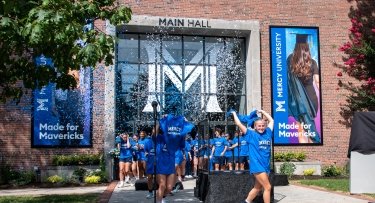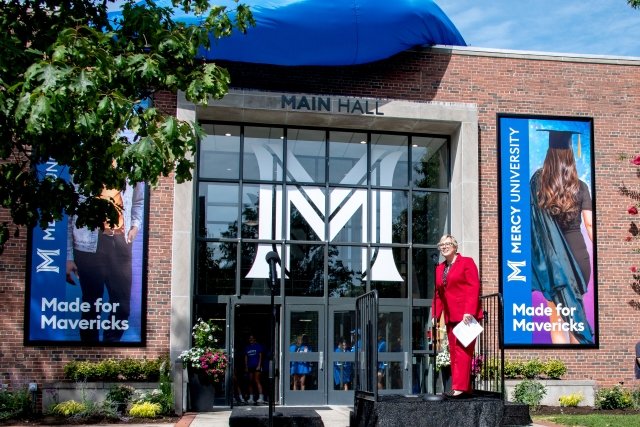
Students celebrate the launch of Mercy University.
Heading into a new academic year with a new name, a new president, and a new sixth school.
Today, Mercy College announced its name change to Mercy University. The change in status, approved by the New York State Board of Regents, reflects the breadth of its programs across a wide variety of disciplines at the undergraduate and graduate levels and is a landmark moment in Mercy’s nearly 75-year existence.
Today’s announcement follows the summer arrival of Dr. Susan L. Parish, who is Mercy’s 13th President, and the addition of a School of Nursing alongside five other schools of Liberal Arts, Business, Education, Health and Natural Sciences, and Social and Behavioral Sciences.
“Becoming a university is the natural evolution for our institution, and firmly rooted in Mercy’s founding principles,” said Susan L. Parish, Ph.D., M.S.W., president of Mercy University. “We celebrate the many ways we have successfully educated thousands of students, who are often the first in their families to attend college. Mercy University looks forward to the next 75 years of growth and enrichment, deepening our community ties, and finding new ways to push higher education forward to advance student success.”
“Today is monumental in Mercy’s history,” said Joe Gantz, chairman of the Mercy University Board of Trustees. “Our unwavering commitment to the students we serve has brought Mercy to this moment and the college is poised to provide exceptional educational opportunities for generations to come.”
“Mercy University will be a force in redefining higher education,” said Eva Fernández, Ph.D., provost and vice president for academic affairs at Mercy University. “We are proud to not only provide access to educational opportunities for students, no matter their circumstance, life stage, or background, but to help them attain degrees that permit them to write their own futures.”
Mercy University reflects the institution’s continued growth. Since its founding by the Sisters of Mercy in 1950, Mercy has evolved and expanded to meet the needs of its students and surrounding communities. In 1961, it became a four-year institution offering baccalaureate programs. In the 1970s, Mercy became independent, non-sectarian, and co-educational, doubling the size of facilities, and establishing branch campuses and extensions to meet the needs of the region. By 1981, Mercy was offering its first graduate program and by the 1990s was offering entire degree programs online. In 2006, Mercy was granted authorization to offer its first doctoral program.
Through all the growth and change over the institution’s rich history, Mercy’s mission of offering transformative education remains strong. Today, Mercy is the region’s largest private minority-serving institution and Hispanic-Serving Institution. Mercy has over 73,000 alumni, more than 8,000 enrolled students, six academic schools, and more than 100 undergraduate degree, graduate degree, and certificate programs. It has three campuses: one in Westchester County and two in New York City (Manhattan and the Bronx), as well as online course offerings. Mercy continues to invest in programs to meet the demands of the current and future workforce.
Mercy University is committed to the core characteristics that have defined and differentiated the institution’s approach since its founding in 1950: keeping students at the center of the organization, breaking down barriers to their success and ensuring they leave ready to realize their ambitions and write their own futures.
“I’m thrilled to witness Mercy College's transformation into Mercy University,” said U.S. Senate Majority Leader Charles E. Schumer. “This new chapter showcases Mercy's dedication to offering transformative education, marking a new era of education and empowerment. As a fierce advocate for federal funding for higher education, I'm proud to support Mercy's mission to break barriers and create opportunities through education. Congratulations to President Susan Parish and the incredible Mercy community. Together, we'll keep fighting for resources to fuel student success, whether it's in Dobbs Ferry, Manhattan, or the Bronx.”
“Congratulations to Mercy College on taking the next step in its rich history as Mercy University,” said U.S. Senator Kirsten Gillibrand. “This momentous transition exemplifies why Mercy stands as a premier higher education institution for students throughout New York City and the Hudson Valley. Mercy’s elevated university designation reaffirms the school’s draw as a preferred destination for countless students embarking on their educational journey. I congratulate Dr. Parish on her new role as President of Mercy University and look forward to our continued work fostering the next generation of great New York leaders.”
“I’m proud to see my alma mater Mercy University continue their path to serve our community and support first generation college students,” said U.S. Congressman Jamaal Bowman, Ed.D. “The additions of these new schools, including the School of Nursing, are only the beginning of the incredible work they’ve been doing for decades. As the largest private minority-serving institution in the area, I know Mercy University will be an uplifting educational force and I’m excited to see our community thrive from these changes.”
“Throughout its long and rich history, Mercy College---now Mercy University—has given thousands of students a chance for a higher education so that they could reach the goals they aspired to, said New York State Senate Majority Leader Andrea Stewart-Cousins. “This latest chapter shows once again how Mercy has grown with the times to encompass an outstanding curriculum, now including the School of Nursing, to enrich the lives of the students it serves. I am delighted that Mercy University is in my Senate District, and I congratulate Dr. Susan Parish on becoming the 13th president of this storied institution.”
“Westchester County is very fortunate to be home to Mercy University’s Dobbs Ferry campus, where thousands of individuals have received the quality of education that is essential to succeeding in life and leading in their communities,” said New York State Assemblymember MaryJane Shimsky. The enhanced offerings and stature that a Mercy education now confers will be of great and lasting benefit to the students and to our region. I look forward to seeing this exciting new phase in Mercy’s evolution come to fruition!”
“Mercy College's transformation into Mercy University marks a profound milestone, capturing the long dedication the institution holds to diverse disciplines and scholastic excellence,” said Westchester County Executive George Latimer. “Mercy University is not just a name change, it is an embodiment of dedication to shaping futures, transforming lives and leading the way in higher education. Here's to the next 75 years of growth, inspiration and empowerment."
“I am thrilled to acknowledge Mercy College’s new name and status as Mercy University,” said Westchester County Legislator David Imamura. “By any name, Mercy has been a cornerstone of Rivertowns community life for decades, and this latest recognition only underscores its historical and ongoing role in preparing students from all locales and backgrounds for bright futures. We are truly fortunate to have such a prestigious higher-education institution positioned right in the heart of Dobbs Ferry.”
“Mercy has been a vital member of the Bronx community for several years. Their campus in my district has served countless students by giving them the tools to succeed in their future careers, and this status change reflects the hard work and commitment to academically prepare our future leaders,” said New York City Council Member Marjorie Velázquez. “This transition brings expanded academic offerings, increased research opportunities, enhanced facilities, and a broader range of resources that will continue to empower students and meet their evolving educational needs by preparing them for success in an ever-changing global landscape. I look forward to Mercy’s continued success as it embraces its new identity as a university and opens a world of opportunities for students, faculty, and researchers alike,”
All logos and signage across Mercy campuses will be updated to reflect the new name. Marketing campaigns throughout New York City and Westchester County including billboards at Times Square, and ads on New York City Transit buses and subways and Metro- North Railroad trains.
To watch today’s announcement, click here.

###
About Mercy University
Mercy University is an independent, coeducational institution serving more than 9,000 students each year across campuses in Westchester, the Bronx, Manhattan, as well as online. It is a federally designated minority-serving institution and the largest private Hispanic Serving Institution in the state of New York. Mercy offers more than 100 undergraduate and graduate degree programs and certificate programs within six schools: Business, Education, Health and Natural Sciences, Liberal Arts, Nursing and Social and Behavioral Sciences. The institution also provides non-credit courses and certificates for adult learners looking to acquire new skills through CERTiFi by Mercy University. Mercy was founded in 1950 by the Sisters of Mercy whose mission of transformative education remains strong. For more information, visit www.mercy.edu.
